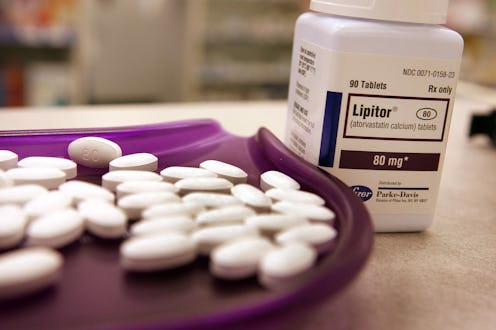News
Want to Prevent Heart Disease? Read This
Good news: your cholesterol level is no longer the end-all, be-all indicator of your heart health. On Tuesday, the American Heart Association and the American College of Cardiology released new guidelines for heart disease prevention that now take into account broader risk factors, rather than just that one little number. Anyone who falls under the risk factors in the new guidelines is now strongly recommended to take cholesterol-reducing statins.
Here are the new risk factors that doctors will be using to assess whether a patient needs to take statins:
- An LDL (aka bad cholesterol) level of 190 mg/dL or higher
- Adults aged 40-75 with Type 2 Diabetes
- Adults aged 40-75 with a 10-year heart disease risk of 7.5 percent or higher (you can use the Risk Calculator here to find out, though the calculator's currently undergoing "enhancements"). The online calculator will also consider factors such as race, sex, and age.
- Anyone who already has heart disease
The implications: the number of Americans on statins may skyrocket. Under previous guidelines, only 15 percent of U.S. adults would have been recommended to take the drugs. With these four newly-delineated groups in the new guidelines, twice as many Americans will be urged to take statins by their doctors. That means 1/3 of adults in the U.S. — or 44 percent of men and 22 percent of women — would be urged to take statins.
Pros: People who are high-risk for heart disease but didn't fall under the former guidelines will now be better informed about what steps they can take for heart disease prevention. Luckily, they will be able to get statins at super-low costs, because patents on some brand-name drugs such as Lipitor and Zocor have expired.
Also, we repeat, your cholesterol number is no longer going to be the end of the world.
Con: As always, there are those scary side effects on the side of the bottle. Last year, an FDA ruling added further warnings to statin use, causing alarm across media outlets (as FDA rulings are bound to).
Let's take a look at statins. What sort of serious risks do they pose?
- Increased risk of cataracts
- Increased risk of diabetes
- Muscle inflammation/pain (rare)
- Possible memory loss (rare)
But, uh, good for your heart. A Harvard Medical School study has demonstrated that all of these effects are incredibly rare, and not "statistically significant." Last year, another study also showed that statins' benefit to reducing heart disease far outweighed its risk of causing diabetes.
Whatever your feelings about statins and their side effects (which, let's be honest, you probably never had until now), do take comfort in the knowledge that whether you're 22 or 52, you'll no longer be defined by the cholesterol number you get from a yearly lab test.
But this still doesn't mean that you're off the hook from exercising or maintaining a healthy diet — both of those recommendations are still under the guidelines for keeping your cholesterol down. So please, if you can, take it easy on the burgers.
Images: Miss Nutrition/Tumblr, memegenerator
